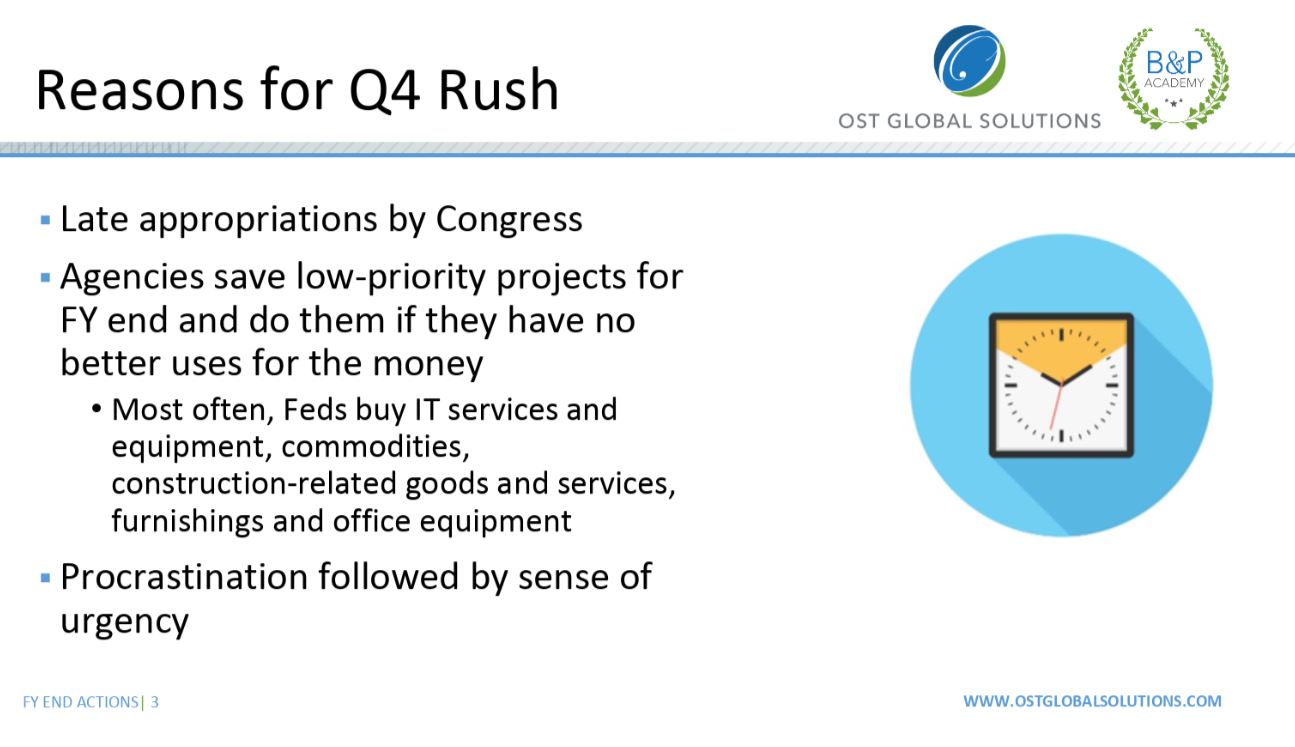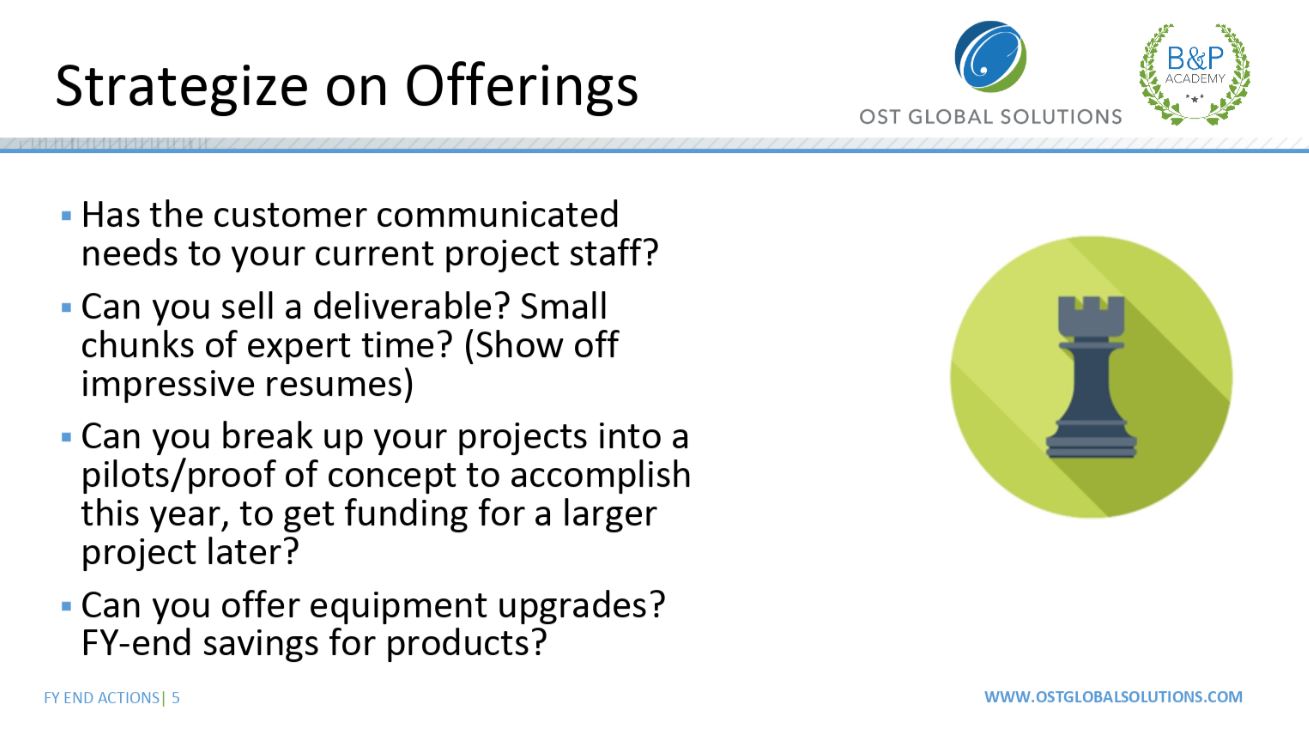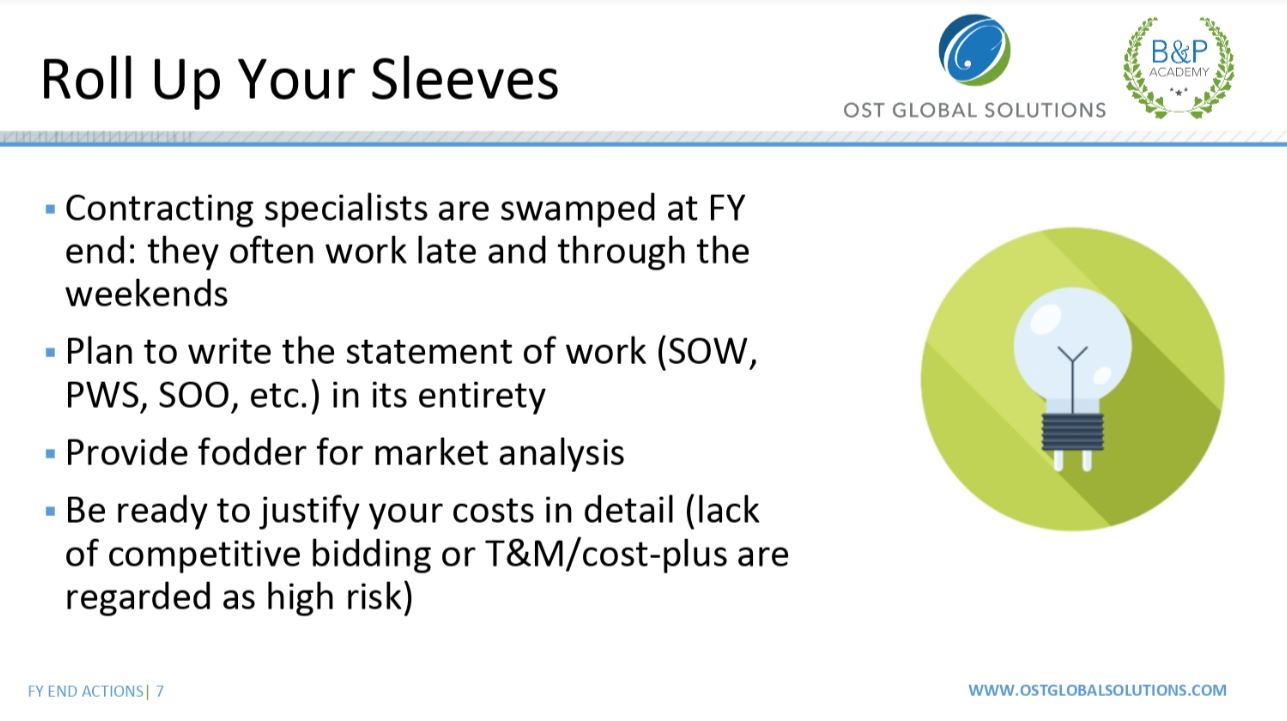We’re in the fourth quarter of the Government fiscal year, and we want to help you take advantage of the federal spending rush. The Government has “use it or lose it” funds and Government contractors need to know how to take advantage of this annual high-volume federal procurement phase.
Federal Fiscal Year Quarters and What They Mean For Your Business
The Government fiscal year begins October 1st. During this first quarter, there is an uptick in procurements as long as there is an approved budget. It’s a busy time for federal contractors. There is another increase in Government spending at the beginning of the second quarter, as well as the third quarter. However, by the third quarter, spending has actually decreased. Very few procurements are released in the third quarter. There could be many reasons for this, including the end of the school year.
Summer is actually when Government contractors are busiest; it’s not the time to sneak in a vacation – or at least not one that’s longer than a few days. July, August, and September are the busiest months of the fiscal year. We have some compelling statistics that illustrate why:
- 16.5% of total annual spending occurs in September
- The Government spends 8.7% during the last week of September
- Spending is 4.9 times higher in the last week than compared with the weekly average for the rest of the year.
For example, in 2014, the State Department spent 35% of its annual budget in September.
How is the Fourth Fiscal Quater Better for Government Contractors?
During the last quarter, sole-source awards and single-bid competitions increase. Single-bid competitions are when only one bidder submits a bid for the contract award. In reality, the Government doesn’t have much choice because they’re rushing. This time provides great opportunities for Government contractors.
The Government has tried to avoid this rush. They’ve even tried changing the rules. The fact is the budget expires at the end of the fiscal year, and your Government customers will lose the opportunity to use the money allocated to them at the beginning of the fiscal year for goods and services. Many agencies and organizations must either allocate those funds or return them to the Treasury’s general fund.
Once they return the money, it appears that they didn’t need the money allocated to them in the first place, and they will have smaller budgets in the future. Agencies don’t like slashed budgets.
Plan Ahead for Government Spending Procrastination
Why does the Government do this year after year? Procrastination is human. Of course, procrastination is often followed by urgency, hence the annual Government spending rush. Other reasons may be to allow for more flexibility. The Government reserves its low-priority projects for the fiscal year-end. They’ll spend money on these projects if they have no other priorities. Some of these types of projects fall in the areas of:
- IT services and equipment
- Commodities
- Construction- related goods and services
- Furnishings
- Office equipment
As a Federal Contractor, You Must Plan Ahead for the End of the Year
If you haven’t planned for the end of this fiscal year, then you’ll have to rush. Either way, you’ll need to keep the following in mind:
- Stay in continuous contact with your customers regarding their needs and your availability. You may be able to extend your company’s footprint at the agency through a last-minute procurement.
- Plan an aggressive sales campaign during the fourth quarter. You and your business developers need to be out there nurturing relationships with your federal customers. You need to determine which of your products and services you can sell.
- Line up extra resources for the high-pressure proposal season in the July-August-September time frame, verifying availability of your internal personnel and consultants.
- Train your project staff and mobilize your subcontractors (call us to learn more about our Business Development for Project Personnel course). All of your project staff should be trained in capture and business development so they can be your eyes and ears on the ground. They should seek opportunities and bring you the information. This will allow you to get quick awards, augment your opportunities pipeline, and add scope to your existing contracts.
- Have established processes for smart bid and no-bid decisions and speedy proposal preparation. You’ll have a lot of conflicting opportunities so you’ll need to know how to make quick choices between them.
The last note is particularly important. Having a quick proposal process means you won’t rely on boilerplate and submit a compliant but tired and unconvincing proposal. Using boilerplate helps you finish the proposal faster, but not to win the contract award.
Next: Strategize on Your Government Offerings
Brainstorm: what are you going to sell to your Government customer? Has your customer communicated additional needs for the project’s next steps? Don’t be afraid to ask them what they actually need. Can you break up your projects into pilots or proof of concept to get funding for larger projects later?
Word of warning: the Government has rules about what they can procure this year for the next fiscal year. For example, they can’t buy fuel this year for delivery next year. Educate yourself on the rules that apply to your industry and work closely with the contracting officer.
Determine what you can sell now. Perhaps your customer needs upgrades on equipment. You could offer fiscal year-end savings. You should have quick ways to get under contract as well. Prepare a one-page capability statement that tells your customer all of the ways to get you under contract quickly. Position yourself to receive notifications on existing single award contracts you have. If the extra work is within scope, have it added to your contract
Be sure to leverage your GSA schedule. The Government only has to receive proposals from three companies and you may be in the best position to do the work while others may bid “blind”. You should leverage your socioeconomically disadvantaged, 8(a), HUBZone, SDVOSB, and woman-owned statuses if you have them to get under contract quickly. All of these designations could get sole-source awards. You could also use your customers’ preferred Indefinite Delivery Vehicles to obtain task orders.
Roll Up Your Sleeves for the Really Hard Work
This time of year, the Government contracting specialists are swamped. Many are working late and on weekends. So there are some things that you should do to help them along:
- Plan to write the entire statement of work for the project you want to be awarded to you, so it’s ready to copy and paste.
- Provide the market analysis. Research the competition and provide it to the contracting officer as justification of your company’s advantages over the alternatives.
- Be prepared to justify your costs in detail – when the procurement doesn’t compete, the burden of making sure your prices are reasonable is much higher on the contracting officer.
- Ensure your company’s email addresses are up-to-date in SAM.gov and the agency’s electronic ordering systems to avoid missing the requests for quotes.
- Keep your product list updated on GSA Advantage and in any other schedules or catalogs that you take part in.
- Make sure the agencies have visibility into your products and your company as a small business.
- Keep your account up to date in the SBA Dynamic Small Business search – this is where many small business representatives and contracting officers search for eligible companies.
- Get on the right Indefinite Delivery Vehicles. For example, get on GSA’s OASIS if your NAICS code fits within the Pool areas, and get on NASA SEWP if you sell IT hardware.
- Update your website and look into other opportunities for higher visibility.
Do You Need Help to Take Advantage of the Fiscal Year-End Spending Rush?
At OST Global Solutions, we help businesses grow through business development, consulting, and training. We’re the home of the Bid & Proposal Academy, and the GovCon Incubator and have used our proprietary BD processes to win our clients over $22 billion since 2005.
If you need training or just someone to come in and help accomplish the hard but necessary work of federal BD, capture, and proposal management, send us an email and [email protected]
Contact us to learn more.



